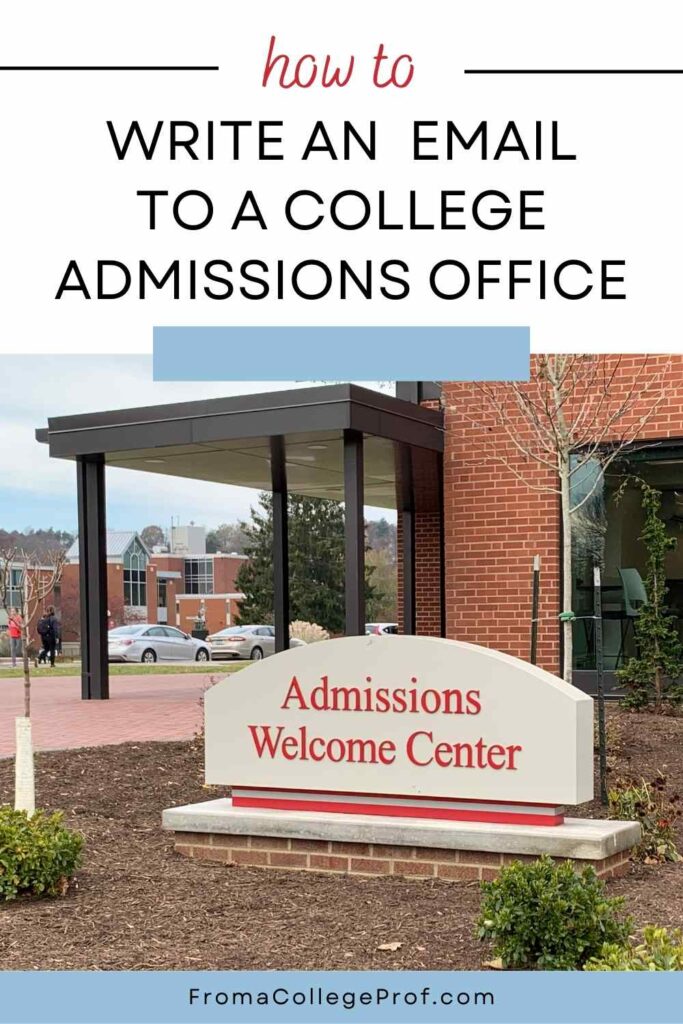When & How to Effectively Email a College Admissions Office

A college admissions expert offers insider tips for when and how to email a college admissions office. Ask yourself these 3 questions to determine if an email is necessary, get examples of good and bad reasons to email, plus see a sample of what to write and how to format your email.
Admissions offices are busy places. Certain times of the year are more chaotic than others, but the Admissions office is hopping most of the time.
Like most workplaces, they’re inundated with emails on a daily basis and it’s difficult to keep up with a burgeoning in-box.
Having spent a couple decades working on a college campus, I know that a good Admissions officer genuinely cares about high school students and wants to be helpful. They will always take the time to answer emails.
But an overload of emails can delay other parts of their job.
That said, there are definitely times when an email is warranted. Read on for insider tips about when and how to email a college admissions office.
An important note: If anyone is sending an email, it should almost always be the student and not the parent.
When Should You Send an Email to College Admissions?
What’s the most important part about emailing college admissions officers? Knowing whether your question or concern is worthy of an email. As a prospective college student, you always want to present the best version of yourself to a university.
3 Questions to Decide If It’s a Good Idea to Email Admissions
There are times when you need to send an email and there are times when it’s not necessary. These 3 questions can help you decide whether or not to email.
- What is the purpose of your email? You should have a clear and specific question or concern in mind.
- Have you searched for the answer on your own? A vast majority of questions that admissions counselors receive are answered on the college’s website and/or their social media channels.
They might also be found in emails or text messages from the school. Search those places for answers before you send an email. You don’t want to give the impression that you’re not resourceful or that you’re not reading important information the college is sending you.
- Are you applying to a highly selective institution? If so, you want to connect with someone in the admissions office to demonstrate your strong interest in the college or university. If not, you should only email if you’re clear about your purpose and have tried to find the answer yourself.
Sending an email to the Admissions office to demonstrate strong interest in the school is ONLY applicable to the highly selective ones. The overwhelming majority of U.S. colleges accept most of the students who apply.
Good Reasons to Email College Admissions Officers
Parents and students often have really good questions that aren’t found on the college’s website or social media channels. Below are examples of questions that could be sent in an email to college admissions:
- When will the first round of acceptance letters be sent out?
- How many incoming students are undecided on their major?
- What resources are available to me if I’m undecided about my major?
- I currently have an IEP in high school and am curious about the resources available to me as a first-year student. Should I contact the Academic Resource office before or after I am admitted?
- Will most of my classes in my first year be taught by adjunct faculty, graduate assistants or full time professors?
- Are interviews required for any of your merit scholarships?
- Is a personal essay required for the Honors College?
NOT Good Reasons to Email College Admissions Officers
Admissions officers understand that parents and students often feel overwhelmed by the college application process. And because they’re amazing, they’ll always answer emails, no matter what questions you ask. But you want to be respectful of their time.
If you spend a little time searching online, you should be able to find the answers for questions like these:
Do you offer academic scholarships for freshmen?
- Scholarship information should easily be found on the Admissions website with corresponding deadlines and application information. Use the search function if you can’t locate it right away.
When is the application deadline?
- These dates are plastered EVERYWHERE on the Admissions website, admissions materials, social media and likely throughout the school’s website.
Do you accept transfer students throughout the year or only in the fall?
- In general, transfer students are admitted on a “rolling basis”, which means throughout the year and at the start of each term or semester. The transfer student admission process should be outlined on the school’s website.
Have you received my high school transcripts, letters of recommendation, SAT or ACT scores yet?
- You can verify receipt of your test scores, transcripts or letters on the college’s applicant portal.
Do you need additional information about my academic achievements or letters of recommendation?
- If they do, they’ll let you know. “Don’t call us, we’ll call you.”
Do I have enough extracurricular activities included on my application?
- There is no minimum or maximum amount and your college admissions officer won’t be able to answer with a definitive number.
Have you made an admissions decision regarding my application yet?
- I know it’s hard to wait for an answer, but if they haven’t notified you, they haven’t made a decision yet.
Are freshmen required to live on campus for their first year?
- This information will be readily available on the college’s website.
Do you offer Actuarial Science (or any other specific program) as a major?
- You should find a complete list of possible majors on the school’s website. Search “majors” or the name of a specific major (“actuarial science”) if you can’t find the list.
Are there opportunities for me to visit campus?
- You can visit campus anytime you want. We encourage families to check out campuses “unofficially” so your student can really get a feel for the school. You can find official opportunities for campus visits on the Admissions website.
Preparing to Send an Email to College Admissions
If your purpose and questions are clear and necessary, then you want to send an email that will elicit interest and a prompt response. Writing this type of email is not much different than other professional emails.
Remember, your ultimate goal is to be accepted! Following our suggestions below will help you make a good impression as a resourceful and respectful student.
How To Find The Right Person To Email
Always personalize your email. It will be better received (and likely replied to sooner) if you address it to a specific individual.
The right person is usually your college admissions officer, but it also might be a regional director responsible for recruitment in your state of residence.
To find contact information for your specific admissions officer or regional director:
- Go to the Admissions page on the college’s website.
- Look under the About tab on the Admissions page. It might also be found on a Meet the Team page or even the Accepted Student page.
- If you can’t find a name and email, call the Welcome Center or front desk of the Admissions office and request the contact information.
Taking the extra time to find a specific person and personalize your email will always be worth it.
Where To Look For Answers Before You Write Your Email
Now that you know who should receive your email, you want to make sure that your email is necessary. Take some time to search for answers to your questions. Be thorough and give more than a cursory look over the college’s website.
College or University Website. College and university sites are robust and may be difficult to navigate. Here are a few places to look:
- Admissions or Financial Aid (especially FAQ pages)
- Applicant portal
- Search bar (on the college’s website or the Admissions section)
College or University Social Media. If you’re having trouble finding the answer to your questions on the website, check their social channels. Save yourself some time and click on their social media links from the website’s header and/or footer to find information like:
- Deadlines
- Application fees
- Application steps
- Common Application options
- When to expect an acceptance letter
- Short YouTube videos for applicants
If it takes too long to find an answer, then your questions are likely shared by many other prospective students. In that case, it’s completely reasonable to send an email to Admissions.
What To Include In The Subject Line
Don’t overlook the importance of a solid subject line. It doesn’t necessarily need to be attention-grabbing, but it does need to be clear and concise.
Be specific. Your subject line should clearly indicate the content and purpose of the email. It should not be something like “I have a question…” or “Can you help me find some information?”
Limit the subject line to 7-8 words. If the admissions officer is checking emails on a computer, most inboxes will show about 60 characters. If they’re using a tablet or phone, they’ll be able to see about 30 characters.
Begin with the most important information. If they happen to be checking email on mobile, the purpose of your email will be unclear if that information is cut off. And they’ll be less likely to open or act on the email quickly.
Below are a few examples of good subject lines:
- Question about Honors College admissions process
- Follow-up on financial aid package
- Thank you for campus visit on [insert date]
- Research opportunities for freshmen
- Opportunities for applicants to connect with alumni
7 Tips to Format an Email to College Admissions
Like the subject line, your email should be brief and specific. Format the email properly: use block formatting with white space between each section/paragraph.
Use a professional tone. This is NOT a text to your friend. (You’d be surprised how many emails we get from high school seniors and even undergraduate students who somehow forget this.)
I know most high school students rarely use email, so some of these suggestions will feel strange to you. But trust me! And use these tips to write emails to your future professors and employers.
- Begin with a salutation and the recipient’s name. A safe and professional option is to begin with Dear followed by the name of the person you’re emailing. Use Mr. or Ms. if you know their gender. If not, use their first and last name.
- Introduce yourself. Don’t assume the admissions counselor recognizes your first name or your email address. Include your first and last name, high school and the semester you’re planning to enroll (e.g., Fall 2023).
- Use numbers or bullets for your question(s). Use a professional tone and be specific about your question(s). If you have more than one question, number them or use bullets to set them apart. This will make it easy for your admissions officer to read.
- Include contact information. Indicate the best way to reach you and be sure to provide a phone number and email address. It never hurts to include the email even though it’s available at the top as well.
- Express gratitude. At the end of the email, thank the admissions officer for their time.
- Finish with a closing and your name. A few professional choices to close an email are Sincerely, Thank you, Respectfully. Use your first and last name here again.
- PROOFREAD. Do not send the email unless you have reviewed it. Kristie and Mary tell their students to proofread by reading out loud. You’re more likely to catch typos and mistakes.
Sample Email to a College Admissions Office
Below is a sample of an email you might send to admissions. We hope this helps you.
Subject Line: Summer orientation question & scholarship application confirmation
Dear Mr. Palmer,
My name is Ken Sigler and I’m currently a senior at Louisville High School. I recently submitted my application for admission as a first-year student for Fall ‘23. I appreciate any assistance you can provide on these follow-up questions:
- Can I register for summer orientation before I submit my enrollment deposit?
- I did not receive a confirmation email for the scholarship application I submitted last week. Could you confirm it was received?
You can reach me at [phone number] and [email].
Thank you for your time.
Sincerely,
Ken Sigler
Good luck as you keep moving forward in the admissions process!

